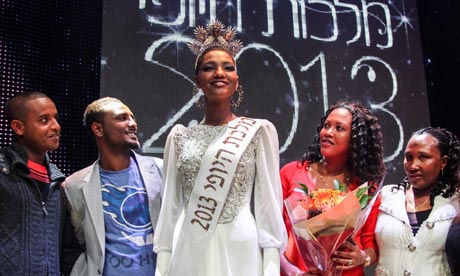As President Obama gets ready to visit Israel next week, news that Yityish Aynaw, the newly crowned Miss Israel, has been invited to dine with him and other VIPs at the state dinner has raised a few eyebrows. Why would a beauty queen be invited to attend a 120-person event that will feature political heavyweights such as Binyamin Netanyahu and the IDF chief of general staff, Lt general Benny Gantz?
My answer to that question is: why not?
From what I've heard of Aynaw's life story and political views, she is not only thoughtful and smart, but also well aware of the power and responsibility that her position wields. As an orphan – her father died when she was two, her mother when she was 12 – her life story is one of triumph over adversity. In other words, she's really no airhead.
Aynaw knows that as an Ethiopian Jew, and Israel's first black beauty queen, she is overturning stereotypes of beauty within her own country and around the world. She is now a role model to other black women – and believe me, we still face constant invalidation as to how we look and think. Thanks to her new title, Aynaw can provide some leadership in a country in which the 120,000 strong Ethiopian Israeli community faces open hostility and racism.
As we progress in our dialogue about what it means to be a woman, isn't it time to shake off the notion that intelligence and beauty are mutually exclusive? Isn't it time that we stop giving credence to the idea that a beautiful woman – even one like Aynaw, who hasn't received a formal higher education – would have nothing to offer, nor that she could not hold her own in a room of powerful men?
I certainly still have misgivings about beauty pageants. They originate from the 1950s, when women were believed to be little more than the sum of their body parts. To some degree, they may continue to contribute to the objectification of women. This is not something that I support.
But in today's Britain, where there are many more opportunities and avenues for women to be heard, it is perhaps too easy to look down on such competitions. By our standards, they are now anachronistic, but in countries where there has not been the same type of progress, to win a beauty contest of this stature is a big deal. To win can provide an opportunity for a woman to have both a platform and a voice that she might not otherwise have been able to get.
And, I ask, why shouldn't a woman make the most of what she has in order to expand her life's options, even if what she has is, yes, her natural beauty? How is this much different from what models do around the world every day? History also suggests that it is possible to use a beauty contest win as a springboard to much greater opportunities (just look at Oprah Winfrey and Halle Berry).
Just as President Obama's wins have been symbolic of shifts in America's generational, racial and cultural landscape, Aynaw's new title may also be indicative of societal changes in Israel that may eventually have a much greater and wider impact. She undoubtedly can communicate a view that most have never heard before. She credits Obama as a source of inspiration and clearly feels a kinship with him. I can understand why he would be interested in meeting her.
Regardless of what one thinks about beauty contests, Aynaw has won, in spite of significant obstacles and prejudices. In this way, she may actually have much more in common with President Obama than the most of the other people at next week's state dinner
